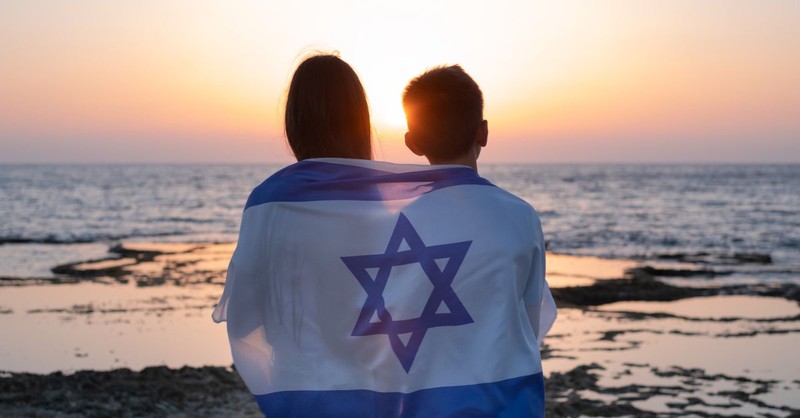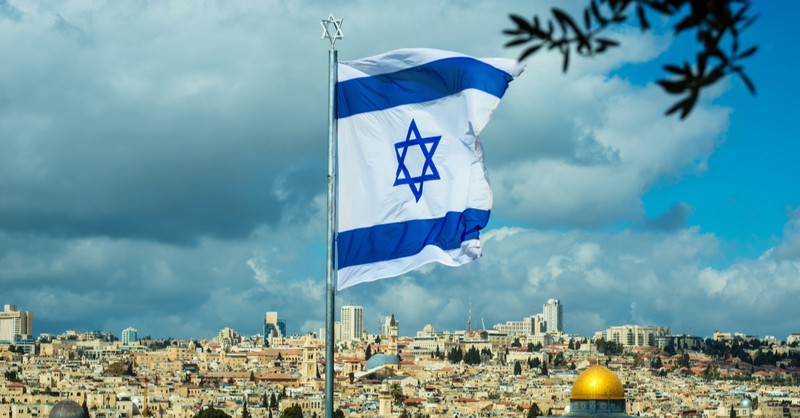
It’s been less than a week since the Palestinian militant group launched a highly coordinated attack on Israel from the Hamas-controlled Gaza Strip. Our social media feeds are blowing up with posts about all aspects of this conflict. Why should Christians be concerned about the country of Israel?
Rather than looking at this new war through a political lens, let’s try to imagine what concerns God about Israel and why this war should concern us.
Photo Credit: ©iStock/Getty Images Plus/Inna Reznik
The Jewish people matter to God.
They are His chosen people. God did not choose the nation of Israel at the callous abandonment of other nations. He chose the Jewish people, through which a Redeemer, Jesus Christ, would come and invite all people to follow Him. God started the process by choosing a person, Abraham (who hailed from modern-day Iraq, not Israel), to begin a family that would eventually become a nationality. Abraham left his culture of polytheism to start a family that would believe differently than everyone around them. Abraham’s descendants through Isaac (the Jewish people) existed first as wanderers, immigrants, and wanderers again before settling in the Promised Land as a nation some 600 years later. What God treasures, we should treasure: His created beings. Abraham’s descendants also included his illegitimate child Ishmael’s children, the Muslim people. But the plan was always for the Messiah and salvation to come through Isaac.
"For you are a people holy to the LORD your God. The LORD your God has chosen you out of all the peoples on the face of the earth to be his people, his treasured possession” (Deuteronomy 7:6-8).
All people matter to God.
The heart of God grieves when people suffer. God is “the lover of our souls” and “the God who sees me.” God is the Father, and we are His children. Jesus is called the Bridegroom, and we are the bride. He is the mother hen, and we are the chicks gathered under her wings. All through the Bible are allegories and poetic comparisons to explain the relationship that God wants with us. From the beginning of time, God planned to be in an intimate relationship with man in a sinless state. Even after Adam and Eve disobeyed God, He protected them and created a Plan B: Jesus. This plan would cost Him deeply, but He was willing to pay the price to stay in an eternal relationship with His creation. God doesn’t rank our importance by race, color, age, or nationality. He just loves us. But He loves the Jewish people in a special way.
“But God demonstrates his own love for us in this: While we were still sinners, Christ died for us. Since we have now been justified by his blood, how much more shall we be saved from God’s wrath through him!” (Romans 5:8-9).

God is redemptive.
He can use a terrible situation and make something good come out of it. Does He allow suffering? Yes, but God uses everything to draw us toward Himself, and He is not obligated to explain why things happen. Job finally acknowledged to God after losing everything and all his children, “I know that you can do all things; no purpose of yours can be thwarted” (Job 42:3). God does not take pleasure in suffering and death. Although suffering exists throughout the world, God wants to gather those people into a faith relationship with Himself, whether they are Jews or Gentiles. We cannot understand God’s plan or timetable, but we must choose to believe that He is good. That is faith.
“But do not forget this one thing, dear friends: With the Lord, a day is like a thousand years, and a thousand years are like a day. The Lord is not slow in keeping his promise, as some understand slowness. Instead, He is patient with you, not wanting anyone to perish, but everyone to come to repentance” (2 Peter 3:8-9).
The land of Israel matters to God.
He chose the Promised Land specifically for His people. He made them fight for it. He instructed them about the borders and the territories of each of the tribes. He specified the place for His presence to dwell—in a very detailed sanctuary on the Temple Mount in Jerusalem (the site of Abraham’s offering of Isaac on Mount Moriah). While Israel wandered for 40 years in the desert, God dwelled in the Tabernacle; once Solomon built the Temple in Jerusalem, God dwelled there. His presence hovered in the Holy of Holies, in a tangible place. All throughout Scripture, the writers describe the land of the Jews, Mount Hermon’s snowcapped peaks, Mount Horeb’s earthquakes, Mount Carmel’s firey miracle, the Sea of Galilee, the plains of Megiddo, the Jordan River, the salt fields of the Dead Sea. The olive groves, the vineyards, the wheat fields, the crashing waves, the desert places. Described by poets, prophets, and historians, Scripture contains visual images of the actual land and the spiritual symbolism the places represent. While we should never worship a location, God regularly marked locations in the Bible so His people would remember and worship Him. This is the power of the Holy Land: remembrance and worship of the Lord God Almighty.
“You will possess their land; I will give it to you as an inheritance, a land flowing with milk and honey. I am the Lord your God, who has set you apart from the nations” (Leviticus 20:24).
Photo Credit: ©Getty Images/Roman Mykhalchuk
Muslims matter to God.
God doesn’t hate Muslims. “God so loved the world that He gave His one and only Son so that whoever believes in Him might be saved” (John 3:16). God specifically welcomes Jews, Gentiles, slaves, masters, women, and men into the Way (salvation through Jesus) throughout the New Testament. Jesus intentionally went against Jewish culture to welcome Syrophoenicians, Romans, Samarians, lepers, prostitutes, tax collectors, demon-possessed, and other marginalized people groups. Paul specifically mentions believers from Africa, Europe, Asia, and the Middle East in His letters to the churches and reprimands Peter about separating from the Gentiles in Jerusalem. God doesn’t hate anyone, not the thief on the cross, not Judas Iscariot, not Herod. God loves us. It doesn’t make sense that He would hate Muslims or that He would want us to hate Muslims. He wants redemption for all of us. Look at God’s promise to Abraham, as he grieved over Ishmael’s future:
“And as for Ishmael, I have heard you: I will surely bless him; I will make him fruitful and will greatly increase his numbers. He will be the father of twelve rulers, and I will make him into a great nation. But my covenant I will establish with Isaac, whom Sarah will bear to you by this time next year” (Genesis 17:20-21).
While American ties to Israel have political importance, we who are followers of Jesus should focus on the spiritual reasons that Christians should be concerned about what’s happening in Israel: God wants the world to know Him.
God is not political. He is loving and just. Here are a couple of ideas to mull over, as we listen to the news and post memes about this sacred, ravaged spot in the Middle East:
Individuals in power are sinful and, therefore, flawed.
Israel, as a nation, began as a theocracy, ruled by judges who defended Israel against their warring neighbors so that God would always be remembered as their supreme authority. Human judges made decisions based on God’s words to them. About 400 years passed between the first judge and first king, Saul, (crowned because Israel wanted to be like its neighboring nations). God’s intention for his people—and for us today—is direct communication and fellowship with Him. The beauty of Jesus’ coming is His redemptive love and acceptance. God extends an invitation to the world to live in a personal theocracy with the Trinity.
“But you are a chosen people, a royal priesthood, a holy nation, God’s special possession, that you may declare the praises of him who called you out of darkness into his wonderful light” (1 Peter 2:9).

Political boundaries are man-made and, therefore, flawed.
God drew national borders for Joshua’s invasion of Canaan for the protection of Israel’s faith. But all throughout Scripture, God commands Israel to accept immigrants and welcome them into a relationship with him. Conversely, God strictly forbids Israel to accept foreign gods (which they did, resulting in the dividing of the kingdom, generations of punishment, and ultimately, exile). While political boundaries are helpful in a modern and divisive world, the people who live there have varying beliefs, origin stories, and desires. We limit God’s ability to speak truth to us when we stereotype or stigmatize people from other nations.
“The LORD did not set His affection on you and choose you because you were more numerous than other peoples… He is the faithful God, keeping His covenant of love to a thousand generations of those who love Him and keep His commands” (Deuteronomy 7:7, 9)
The Millennial Reign will be universal and under Jesus’ authority.
The Garden of Eden was not a country, and when Jesus Christ returns to establish His 1000-year kingdom, there won’t be any countries or rulers. Just Jesus. Eternity in heaven? Just Jesus (with God the Father and the Holy Spirit). While national borders and governments are helpful for keeping us safe and orderly, the world’s system of countries with standing armies and elected officials was never God’s plan for us. For 2000 years, God has called us to share the gospel “to the uttermost parts of the world.” The first century established the Church under persecution and religious oppression.
“Then I heard what sounded like a great multitude, like the roar of rushing waters and like loud peals of thunder, shouting: ‘Hallelujah! For our Lord God Almighty reigns. Let us rejoice and be glad and give him glory!’” (Revelation 19:6-7).
Should we be concerned for peace in Israel?
Absolutely.
Pray for Israel?
Absolutely.
Pray for its families and government. Also, pray for Israel’s neighboring countries and for their families and governments. Pray for the Middle East to find Jesus.
Photo Credit: ©Getty Images/John Theodor
Originally published Thursday, 12 October 2023.










